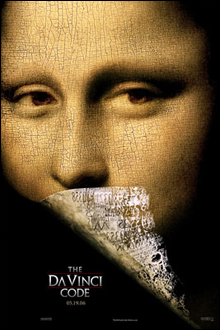|

CONSPIRACY?: Why aren't all three of these packaged together?
|
You’d have expected this trio to arrive as a boxed set, but for reasons even Dan Brown might be hard-pressed to explain, the Da Vinci Code soundtrack is on Decca instead of Sony. That aside, Hans Zimmer’s score is as conventional as Ron Howard’s movie, with unfamilar (anagrammatic?) titles like “Daniel’s 9th Cipher” and “The Citrine Cross” but otherwise the expected inspirational pseudo-mediævalisms. It peaks with Tom Hanks’s epiphany at the Louvre, a brooding, pulsing, ever-modulating, never-resolving four-minute crescendo that works best if you’ve just seen the film. Then, over the end credits, Richard Harvey’s mod-modal “Kyrie for Mary Magdalene.” No revelations here.
“Music inspired by The Da Vinci Code,” Jan Kisjes's The Da Vinci Code Project (Sony Classics) originated in the Netherlands, but its 14 tracks take in Latin, French, English, and “Scottish” (as in “Revelation o’ the Truth”) as they spew the likes of “Fibonacci gave us/A key t’ find the truth/Elle est possedée par/Les voix du mal./We have to stop her, now!” and “Sarah, my sweet little darlin’/You’re a very special child/Your father was the only son of God.” These sacred truths are rendered in an unvarying beackbeat-heavy 4/4 with bells, whispers, organ, strings, accordion, piano, and Phil Cunningham’s whistles. Europopchant, Europopchorus, Europopdivas, and a Maurice Chevalier wanna-be = Europopdrivel.
Da Vinci: Music from His Time is a generous 70 minutes from the Sony vaults, mostly recordings by Paul van Nevel’s Huelgas Ensemble and Konrad Ruhland’s Capella Antiqua München, that’s heavy on Josquin des Prés and light on dance music and Johannes Ockeghem. The performances are decent enough, but those who don’t go weak in the knees when they see Vitruvian Man on a CD-booklet cover might as well buy a Josquin disc by A Sei Voci or the Tallis Scholars.
ADVERTISEMENT
 |